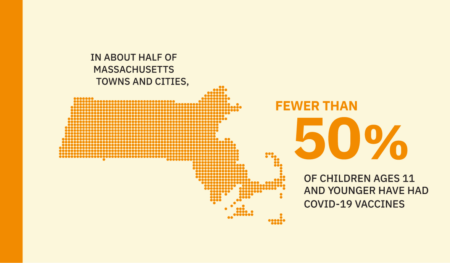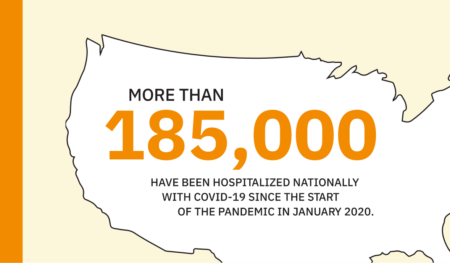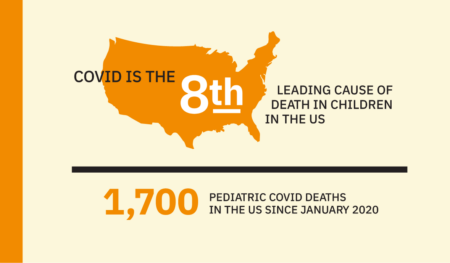Why vaccinate our children against COVID-19 at this point?
Why vaccinate our children against COVID-19 at this point?



We know—you have heard a lot about COVID vaccines. And you have concerns.
You may wonder why or if COVID vaccines for kids are even relevant anymore.
You may be worried about side effects of the vaccine.
You may have thought—maybe I’ll just give it some more time before vaccinating my kids.
Let’s talk about it.
“What about side effects?”

I’ve heard that the vaccines can hurt kids’ hearts—that thing, myocarditis? That’s serious! I just can’t help worrying about the risk of something like this…how can I go ahead and vaccinate my kid and take that chance?
What we know:
Myocarditis is an inflammation of the heart muscle—and yes, it is a serious condition. Viral infections like COVID-19 are a common cause of myocarditis. In fact, people who get COVID are 16 times more likely to get myocarditis.
Compare that to the risk after vaccination: Instances of myocarditis after getting the COVID vaccine are much less common (and most people who did get it responded well to care and felt better quickly).

“I’ve heard the vaccines just aren’t safe for children.”

I just feel like we really don’t know enough about these new vaccines, and I’m not going to have my baby get a shot of something unknown. What do we really know about them and how they affect kids, especially really little kids??
What we know:
The most widely used vaccines in children are based on mRNA (messenger RNA), offered in close to 90% of the countries and regions that have approved vaccines for kids. Researchers have been working with mRNA vaccines for decades for flu, Zika, rabies, and cytomegalovirus (CMV). Cancer research has also used mRNA to trigger the immune system to target specific cancer cells.
The mRNA vaccines “are really safe vaccines for everybody, including children,” says Kawsar Talaat, an infectious-disease physician and vaccine scientist at the Johns Hopkins Bloomberg School of Public Health. Given to millions of adults before being used in children, they have an “unparalleled” safety record, she says.

“I don’t think the vaccine really works anyway!”

It seems like everyone I know who got the vaccine got COVID anyway, so what’s the point?! Kids already have to get enough shots for school, so why add this one?
What we know:
Many studies have shown that in the U.S., the COVID-19 vaccines prevented millions of deaths and many millions of hospitalizations for severe illness—and these continue to be risks with repeat COVID cases.
For children, a major modeling study found that among children ages 5 to 17, a COVID-19 booster campaign that achieved coverage similar to flu vaccination could have avoided an estimated 5,448,694 days of school absenteeism due to COVID-19 illness. In addition, the booster campaign could have prevented an estimated 10,019 hospitalizations among the pediatric population ages 0 to 17 years.

“Is it true that getting my kids vaccinated can help protect their grandparents from COVID -19?”

My parents are getting older and have some health issues, and I worry about them. But I don’t know how much getting my kids vaccinated would really help?
What we know:
According to the American Lung Association , vaccination not only reduces the risk of short- and long-term health complications from COVID-19, but it also slows the spread of the disease by preventing it from being passed onto others who are at high-risk for severe COVID-19 illness, like grandparents or daycare staff or teachers with underlying medical conditions.
In a 2023 survey of Massachusetts parents, protecting grandparents and vulnerable family members, friends, and school and daycare staff was a major motivation for having their children get the COVID-19 vaccine.

“My kids already had COVID—so why do they still need the vaccine ?”

I’m not worried about COVID—everyone I know AND their gets kids got COVID a while ago, so I don’t know why we’re still talking about this?
What we know:
Children who have had COVID-19 once can get it again and spread it to family members. COVID-19 is still highly prevalent and continues to carry risk of serious illness, long-term effects, and death: From December 2022 to May 2023, the American Academy of Pediatrics reports that an average of 24,000 children per week were diagnosed with COVID-19. And these are likely undercounts, as home testing isn’t included in the numbers.
But nationally, only 32% of children ages 5 to 11 have had two doses of the COVID-19 vaccine as of May 2023. With such low vaccination rates among children, there is a greater risk of new variants.

CDC booster vaccine guidance



We know—you have heard a lot about COVID vaccines. And you have concerns.
You may wonder why or if COVID vaccines for kids are even relevant anymore.
You may be worried about side effects of the vaccine.
You may have thought—maybe I’ll just give it some more time before vaccinating my kids.
Let’s talk about it.
“What about side effects?”

I’ve heard that the vaccines can hurt kids’ hearts—that thing, myocarditis? That’s serious! I just can’t help worrying about the risk of something like this…how can I go ahead and vaccinate my kid and take that chance?

What we know:
Myocarditis is an inflammation of the heart muscle—and yes, it is a serious condition. Viral infections like COVID-19 are a common cause of myocarditis. In fact, people who get COVID are 16 times more likely to get myocarditis.
Compare that to the risk after vaccination: Instances of myocarditis after getting the COVID vaccine are much less common (and most people who did get it responded well to care and felt better quickly).
“I’ve heard the vaccines just aren’t safe for children.”

I just feel like we really don’t know enough about these new vaccines, and I’m not going to have my baby get a shot of something unknown. What do we really know about them and how they affect kids, especially really little kids??

What we know:
The most widely used vaccines in children are based on mRNA (messenger RNA), offered in close to 90% of the countries and regions that have approved vaccines for kids.
Researchers have been working with mRNA vaccines for decades for flu, Zika, rabies, and cytomegalovirus (CMV). Cancer research has also used mRNA to trigger the immune system to target specific cancer cells.
The mRNA vaccines “are really safe vaccines for everybody, including children,” says Kawsar Talaat, an infectious-disease physician and vaccine scientist at the Johns Hopkins Bloomberg School of Public Health. Given to billions of adults before being used in children, they have an “unparalleled” safety record, she says.
“I don’t think the vaccine really works anyway!”

It seems like everyone I know who got the vaccine got COVID anyway, so what’s the point?! Kids already have to get enough shots for school, so why add this one?

What we know:
Many studies have shown that in the U.S., the COVID-19 vaccines prevented millions of deaths and many millions of hospitalizations for severe illness—and these continue to be risks with repeat COVID cases.
For children, a major modeling study found that among children ages 5 to 17, a COVID-19 booster campaign that achieved coverage similar to flu vaccination could have avoided an estimated 5,448,694 days of school absenteeism due to COVID-19 illness. In addition, the booster campaign could have prevented an estimated 10,019 hospitalizations among the pediatric population ages 0 to 17 years.
“Is it true that getting my kids vaccinated can help protect their grandparents from COVID -19?”

My parents are getting older and have some health issues, and I worry about them. But I don’t know how much getting my kids vaccinated would really help?

What we know:
According to the American Lung Association , vaccination not only reduces the risk of short- and long-term health complications from COVID-19, but it also slows the spread of the disease by preventing it from being passed onto others who are at high-risk for severe COVID-19 illness, like grandparents or daycare staff or teachers with underlying medical conditions.
In a 2023 survey of Massachusetts parents, protecting grandparents and vulnerable family members, friends, and school and daycare staff was a major motivation for having their children get the COVID-19 vaccine.
“My kids already had COVID—so why do they still need the vaccine ?”

I’m not worried about COVID—everyone I know AND their gets kids got COVID a while ago, so I don’t know why we’re still talking about this?

What we know:
Children who have had COVID-19 once can get it again and spread it to family members. COVID-19 is still highly prevalent and continues to carry risk of serious illness, long-term effects, and death: From December 2022 to May 2023, the American Academy of Pediatrics reports that an average of 24,000 children per week were diagnosed with COVID-19. And these are likely undercounts, as home testing isn’t included in the numbers.
But nationally, only 32% of children ages 5 to 11 have had two doses of the COVID-19 vaccine as of May 2023. With such low vaccination rates among children, there is a greater risk of new variants.
We hear you!
These are some of the common worries we’ve heard from parents. You may share them or have your own.
The best person to answer your questions and talk about your concerns is your pediatrician or health clinic. Even if you’re not ready to make a decision about vaccination, talk to them, and keep the conversation going.